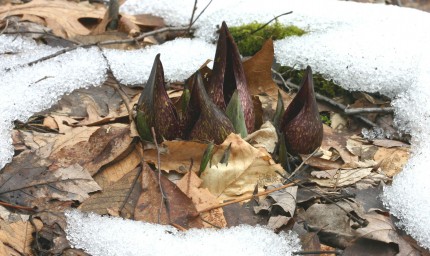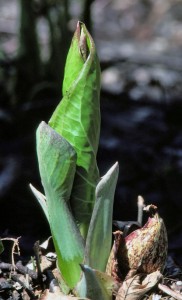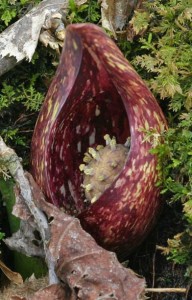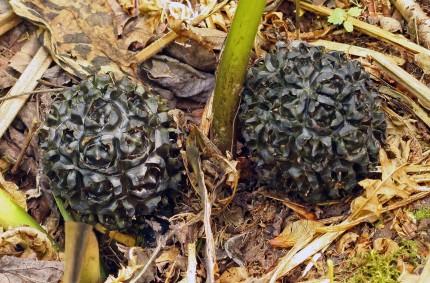

(Chelsea Update would like to thank Tom Hodgson and the Waterloo Natural History Association for the photos and information in this column.)
April showers may bring May flowers, but March is the month for our first wild bloom.
In fact, this flower sometimes even appears in late February. A delicate blossom it is not, and its fragrance is unforgettable in a negative way. Its rosettes of large leaves and its offensive perfume make its name “Skunk Cabbage” totally appropriate.
Skunk Cabbage is a member of the arum family; which also includes three other local species Jack-in-the-pulpit, wild calla, and arrow arum. It can bloom so early because it has the ability to produce heat and literally melt its way through winter snow and ice.
The Skunk Cabbage flower head is protected by a large fleshy hood called a spathe, and the temperature inside this spathe can be 30 degrees above its surroundings. If one sticks the tip of a finger inside a spathe on a cold wintery day, the warmth can actually be felt.
The heat and the “skunky” odor the spathe produces attract flies that pollinate the flowers inside.
Next to each spathe, a sharply pointed leaf bud can usually be found. In April and May, this bud will develop into a whorl of large, bright green leaves. Skunk Cabbage leaves dominate the floor of wetland woods throughout the spring and early summer.
In July, deprived of sunlight by the forest canopy, they will begin to decompose. Because they are mainly water and contain very little

fiber, they literally melt away.
By August, all that remains of the leaves are a few stems. The spathe has also melted away, leaving behind a round cluster of fruits that resembles an old hand grenade. The fruiting clusters will be torn apart by animals. Some of the scattered seeds will germinate to produce new plants.
Skunk Cabbage is very common along the boardwalks of the lowland woods and bog trails at the Discovery Center, and the Discovery Center trails are open to the public seven days per week, year around.





















